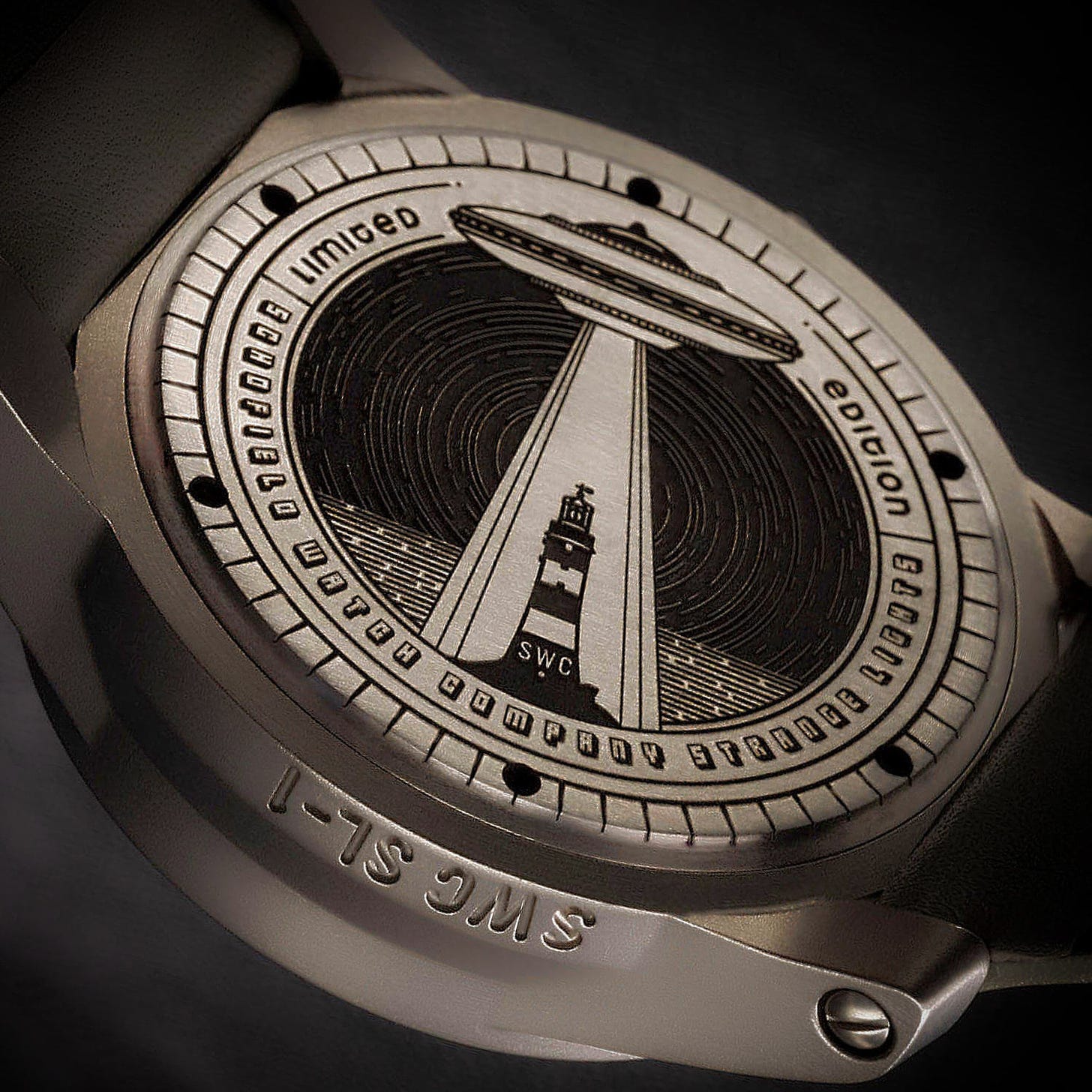Let's talk titanium watches and more specifically - titanium. Discovered in Cornwall in 1791, and there we have a nice link to the Blacklamp Carbon watch we made which has a structure akin to the crazy geology of the cliffs of Milook Haven near Bude. Titanium was named after the Greek Titans. It is the 7th most abundant metal in the Earth's crust. It has been detected in the sun, M-type stars, meteorites and it makes up 12.1% of moon rock composition. But that is generally an oxide because pure metallic titanium is very rare. 95% of all titanium ore is refined into titanium dioxide, a white pigment used in pretty much everything that is white - paint, sunscreen, toothpaste, paper, plastics, etc... Seen here is the Blacklamp Carbon, not for sale.
So why is titanium such a cool material for watches? Titanium reacts immediately with air to form a thin non-porous passivation layer that continues to grow for about 4 years to a thickness of 25nm. A shield that protects the body of metal. This makes titanium watches as corrosion resistant as platinum ones. It is non-magnetic, it has the highest strength to weight ratio of any metal. Titanium is roughly 40% lighter than steel but just as strong. Twice the strength of aluminium but only 60% heavier and it is here that we have the titanium watches paradox. Whilst it is a commonly accepted metal for watch cases it falls short for luxury heft. On paper it should be the number one metal for cases but alas, if it is not heavy it is not precious. It is more expensive than steel as a raw material and is more difficult to machine but within the luxury sector cost is not the limiting factor in its ubiquity, it is weight.
That said, and thanks the Citizen X-8 in 1970 who were the first to use it, we see more titanium watches on the market every year, so perhaps the on-paper specs make more sense than our senses. Rolex launched its first ever commercially available full titanium watch in 2022 marking an important milestone for the metal's luxury value. Even though every other watchmaker of note has had to make a titanium watch, very few are vaulted and coveted like their steel counterparts. As of 2023, you could look at Audemars Piguet, Grand Seiko and Vacheron Constantin for some stellar examples.
Where does the Strange Lights fit in? For starters the case, including the case back are fully machined and finished in the UK, the cases are machined in Dorset and we do the finishing here in Sussex. The laser engraving is done between the two counties in Hampshire. We use Grade 5 Ti-6AL-4V (similar to the Rolex Sea Dweller RLX and the same as Richard Mille), an alloy with 6% aluminium and 4% vanadium. It is an expensive alloy favoured for its hardness and machining capabilities. However, titanium has poor thermal conductivity so heat builds up between the surface of the part and the cutting tool, thus creating a characteristic chatter in the cut as the tool expands and shrinks, so you will also see greater tool wear. We use state-of-the-art 5 axis CNC mills with skilled engineers who work with titanium all day long, especially within the military sector. In short, they know what they are doing and that mitigates the difficulties of working with this metal. So, to see the quality of finish as we do on the Strange Lights is testament to the quality of the case machining and precision.
The Strange Lights brings together the Schofield themes of sea and space. Titanium has so many specialist applications both in marine and space exploration. The International Space Station is estimated to have 22,226 Kg of titanium onboard comprising 7% of its total mass. So, the Strange Lights had to be titanium as soon as the idea took hold. The case back features a romantic look at these notions with the use of a 1950s UFO shining its light/beam on Smeaton's Tower Lighthouse, a strange light that would be! But we also see a star circle, not just showing the passing of time but also a map or a guide. The fact that this design is like a mission patch is no coincidence. SWC SL-1 (indicating that one day they may be more iterations of this watch) is mechanically engraved on the side giving us this ship's identity.
The Strange Lights is a limited watch in two dial colours; Not Quite Green and Not Quite Red, port and starboard lights. In the sky or on the water?





